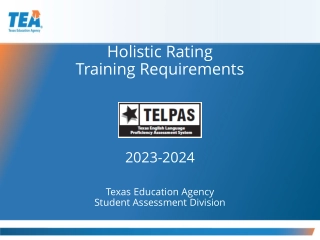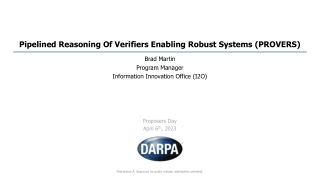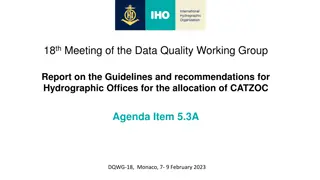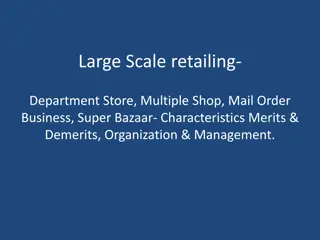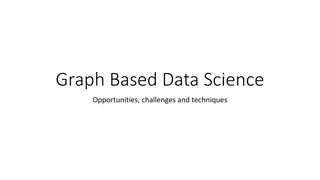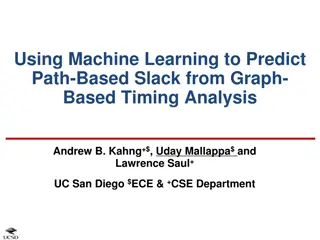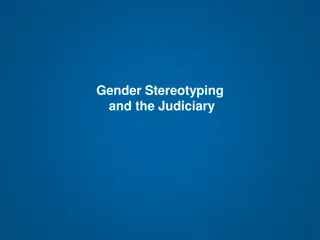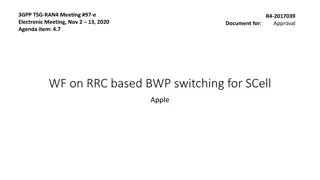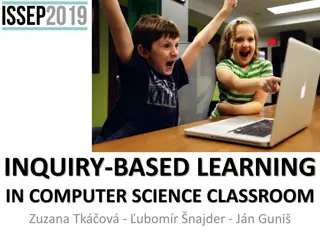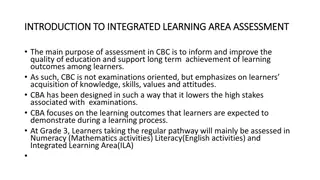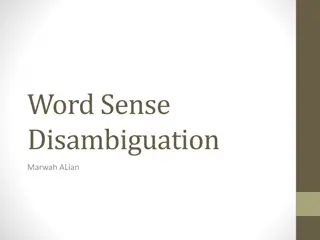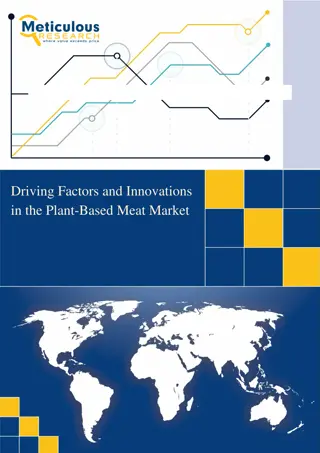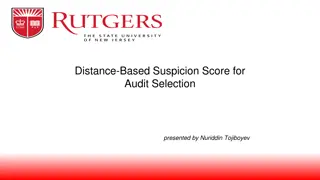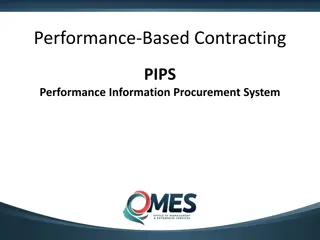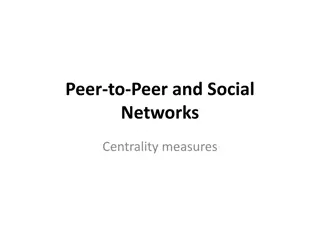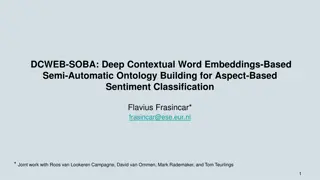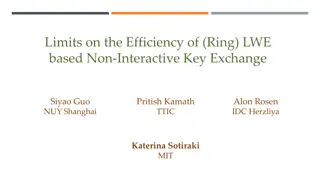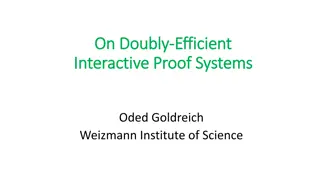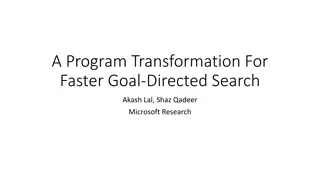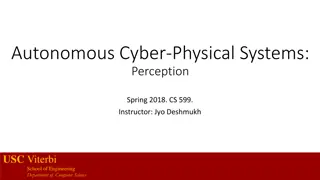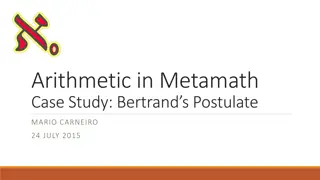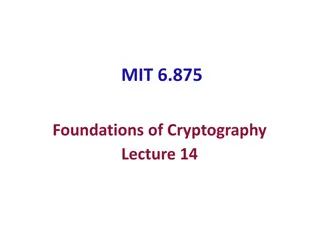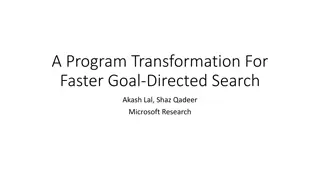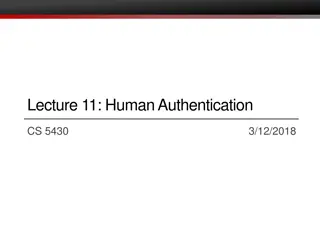Function Based Thinking
Function-based thinking in Missouri Schoolwide Positive Behavior Support, emphasizing data-based decision-making, mission clarity, and effective teaching practices. Understand how behavior is related to the environment and how environmental interventions play a key role in shaping expected behaviors
6 views • 27 slides
Holistic Rating Training Requirements 2023-2024 by Texas Education Agency
Holistic Rating Training Requirements for TELPAS components for grades K-12 in Texas include calibration, basic training, and responsibilities for raters. Raters and verifiers are educators assigned to rate students eligible for special holistic administrations. Rater credentials mandate valid Texas
1 views • 36 slides
Pipelined Reasoning Of Verifiers Enabling Robust Systems (PROVERS)
The PROVERS program aims to develop automated formal methods tools integrated into software development pipelines to enable the incremental production and maintenance of high-assurance national security systems. Addressing DoD challenges and vulnerabilities in weapon systems, the initiative emphasiz
3 views • 25 slides
Adhesives which harden without chemical reaction
Adhesives can harden without a chemical reaction, using water-soluble materials, or through the loss of solvents. Environmental pressures are leading to the development of water-based adhesives to replace solvent-based ones. Various adhesives like neoprene adhesives and starch-based pastes offer dif
1 views • 17 slides
National Council on Gender-Based Violence and Femicide Bill, 2023 Overview
The National Council on Gender-Based Violence and Femicide Bill, 2023, aims to establish a statutory body to lead in the elimination of gender-based violence and femicide in South Africa. The Bill aligns with the National Strategic Plan and sets out provisions for the Council's establishment, purpos
1 views • 10 slides
Scale Based Regulation 2023 - Non-Banking Financial Company (NBFCs)
On October 19, 2023, the Reserve Bank of India (\u201cRBI\u201d) has issued \u2018Master Direction \u2013 Reserve Bank of India (Non-Banking Financial Company \u2013 Scale Based Regulation) Directions 2023\u2019 (\u2018SBR Master Direction\u2019). The SBR Master Direction aims to harmonize the Previ
0 views • 9 slides
Precision Fermentation in Sustainable Food Production
Precision Fermentation is a specialized bioprocessing technique that utilizes microbes as cell factories to produce specific functional ingredients like proteins, vitamins, enzymes, and more. This innovative technology addresses the challenges of increasing food demands in a sustainable way, offerin
0 views • 12 slides
Guidelines and Recommendations for Hydrographic Offices CATZOC Allocation
The report highlights guidelines for Hydrographic Offices to allocate CATZOC values based on minimum bathymetry standards, ZOC categories, and best practices from various national methodologies. It covers position accuracy, depth accuracy, and seafloor coverage criteria. The allocation is primarily
6 views • 18 slides
Chat Based data Engineering Tool Leading the Way with Ask On Data
To stay ahead of the curve in the fast-paced field of data engineering, creativity is essential. Chat-based solutions are becoming a major player in the development of data engineering as businesses look to streamline their data workflows. Chat based data engineering is transforming how teams intera
3 views • 1 slides
Understanding Competency-Based Education in Modern Curricula
Explore the differences between new and old curricula, grasp the concept of theoretical versus competency-based education, and delve into the benefits of competency-based learning. Discover how competency-based education shifts the focus from grades to students' competence in subjects.
4 views • 10 slides
Routines-Based Intervention for Early Childhood Home Visiting
Learn about the Routines-Based Intervention for Early Childhood Home Visiting by Robin McWilliam from the Evidence-based International Early Intervention Office. Explore how children learn, service decision-making, support provision, and evaluation. Understand the importance of needs assessment, eng
0 views • 34 slides
Understanding Carbon-Based Nanomaterials and Their Technical Applications
Carbon-based nanomaterials, including fullerenes and carbon nanotubes, have revolutionized various industries with their unique properties. These materials, classified based on their geometrical structure, have applications in fields such as electronics, gas storage, biotechnology, and more. Fullere
0 views • 12 slides
Understanding Large Scale Retailing and Store Classification
Large scale retailing encompasses department stores, multiple shops, mail-order businesses, and super bazaars. It can be classified into store-based and non-store based retailing, further divided based on ownership and merchandise offered. Store-based retailers include independent retailers, chain r
1 views • 16 slides
Exploring Graph-Based Data Science: Opportunities, Challenges, and Techniques
Graph-based data science offers a powerful approach to analyzing data by leveraging graph structures. This involves using graph representation, analysis algorithms, ML/AI techniques, kernels, embeddings, and neural networks. Real-world examples show the utility of data graphs in various domains like
3 views • 37 slides
Machine Learning for Predicting Path-Based Slack in Timing Analysis
Utilizing machine learning to forecast path-based slack in graph-based timing analysis offers a solution for optimizing power and area efficiency in the design process. The Static Timing Analysis incorporates accurate path-based analysis (PBA) and fast graph-based analysis (GBA) to estimate transiti
1 views • 31 slides
Understanding Different Types of Recommender Systems
Recommender systems play a crucial role in providing personalized recommendations to users. This article delves into various types of recommender systems including Collaborative Filtering, Content-Based, Knowledge-Based, and Group Recommender Systems. Collaborative Filtering involves making predicti
0 views • 7 slides
Gender-based Violence Against Women in the Judiciary
Gender-based violence against women refers to violence directed at women because of their gender, encompassing physical, mental, and sexual harm, coercion, and deprivation of liberty. The judiciary plays a crucial role in addressing wrongful gender stereotyping in gender-based violence cases to ensu
0 views • 16 slides
RRC-Based BWP Switching for SCell Approval Document
Background on RRC-based BWP switching triggered by RRC re-configuration of firstActiveDownlinkBWP-Id or firstActiveUplinkBWP-Id. Requirements and delay considerations for BWP switch in SCells based on TS 38.331 and TS 38.133. Way forward involves sending LS to RAN2 for clarification and potential up
0 views • 4 slides
Enhancing Assessment in Physical Education through Performance-Based Methods
Zimbabwe's ZIMSEC explores the feasibility of Performance and Authentic-Based assessments for the Physical Education, Sport, and Mass Displays (PESMD) practical components. The study aims to enhance the accuracy of assessing candidates based on real performances, aligning with the Competence-Based C
0 views • 18 slides
Social Workers' Response to Gender-Based Violence: Skills, Training, and Recommendations
This presentation explores the response of social workers to gender-based violence, focusing on the prevalence of such violence globally and in South Africa. It discusses the study methodology, key themes from social workers' responses, and concludes with recommendations for strengthening social wor
2 views • 15 slides
**Exploring Inquiry-Based Learning in Computer Science Education**
Inquiry-based learning (IBL) in computer science classrooms focuses on fostering communication, collaboration, decision-making, and problem-solving skills among students. The approach involves students constructing knowledge through independent, active activities based on real-world experiences. How
0 views • 18 slides
Comprehensive Overview of Integrated Learning Area Assessment in CBC Curriculum
The assessment in Competency-Based Curriculum (CBC) focuses on improving education quality and supporting long-term learning outcomes. At Grade 3, learners are mainly assessed in Numeracy, Literacy, and Integrated Learning Area (ILA). ILA assessment is project-based, integrating knowledge and skills
0 views • 5 slides
Understanding Word Sense Disambiguation: Challenges and Approaches
Word Sense Disambiguation (WSD) is a complex task in artificial intelligence that aims to determine the correct sense of a word in context. It involves classifying a word into predefined classes based on its meaning in a specific context. WSD requires not only linguistic knowledge but also knowledge
2 views • 12 slides
Comparison of Trigger-based vs. Non-Trigger-based Sensing Measurement in IEEE 802.11
The document discusses the differences between Trigger-based (TB) and Non-Trigger-based (Non-TB) sensing measurement instances in IEEE 802.11 standards, focusing on who initiates the sensing measurement. TB sensing is initiated by the AP, while Non-TB sensing is initiated by a non-AP STA, enabling o
6 views • 13 slides
Plant based meat market 4
The changing lifestyles and an increasing number of health-conscious consumers are increasing the popularity of plant-based meat products, positively impacting the demand for plant-based meat. The growth of the plant-based meat market is mainly attri
1 views • 4 slides
Comparison of GUI-Based and Text-Based Assignments in CS1
This study investigates the effectiveness of GUI-based assignments compared to text-based assignments in a CS1 course. The research explores how student motivation impacts their performance and retention in the course. It also delves into student preferences between GUI-based and text-based assignme
0 views • 19 slides
Understanding Item-Based vs Index-Based Iteration in Programming
Exploring the differences between item-based and index-based iteration methods in programming, this content delves into the syntax, readability, and when to use each approach. It provides examples and scenarios to illustrate the use of these iteration methods and discusses the accumulator pattern an
0 views • 17 slides
Distance-Based Suspicion Score for Audit Selection
Nuriddin Tojiboyev presented a method for audit selection based on distance measures, risk filtering, and exception sorting. The approach involves selecting representative samples from a population of records, using risk-based filtering to prioritize records for review. Various filters and exception
0 views • 19 slides
Understanding Quality of Life and Its Impact on Society
Quality of life is not just a concept but a way of living that influences our judgments, standards, and priorities. Quotes from notable figures emphasize the importance of setting high standards and valuing quality in all aspects of life. The discussion delves into different perspectives on quality
0 views • 16 slides
Performance-Based Contracting and PIPS Approach
Performance-Based Contracting involves agencies defining problems for contractors to bid on, while the PIPS approach offers benefits like risk identification and mitigation plans, process efficiencies, and profit maximization through supplier expertise. It emphasizes simplicity, accuracy, measurabil
0 views • 25 slides
Understanding Centrality Measures in Peer-to-Peer and Social Networks
Centrality measures in networks quantify the importance of nodes based on their influence, accessibility, and role as connectors. Important centrality measures include Degree centrality (based on the number of connections), Closeness centrality (based on short paths to other nodes), and Betweenness
0 views • 27 slides
Semi-Automatic Ontology Building for Aspect-Based Sentiment Classification
Growing importance of online reviews highlights the need for automation in sentiment mining. Aspect-Based Sentiment Analysis (ABSA) focuses on detecting sentiments expressed in product reviews, with a specific emphasis on sentence-level analysis. The proposed approach, Deep Contextual Word Embedding
0 views • 34 slides
Limits on the Efficiency of Ring LWE-based Key Exchange
This study explores the limitations of Ring LWE-based key exchange protocols and their impact on non-interactive key exchange mechanisms. It discusses the LWE assumption, noise distribution, and the practical implications of small moduli q and noise-to-modulus ratio r. Additionally, it delves into P
0 views • 71 slides
Efficient Interactive Proof Systems Overview
This document discusses various aspects of efficient interactive proof systems, including doubly efficient IPs, simple doubly efficient IPs, and the Sum-Check Protocol. It explains concepts such as completeness, soundness, and strategies for verifiers and provers. The content covers examples like NP
0 views • 12 slides
Advanced Program Optimization Techniques for Efficient Verification and Goal-Directed Search
Explore advanced program optimization techniques targeting program verification and goal-directed search, including deep assertions, inlining-based verifiers, and lazy inlining algorithms. Learn about optimizations that preserve semantics and improve execution/verification time.
0 views • 34 slides
Understanding Perception and Segmentation in Autonomous Cyber-Physical Systems
Delve into the realm of perception and segmentation in autonomous cyber-physical systems, exploring LiDAR and vision data representation, segmentation algorithms, and popular approaches for data representation. Discover how segmentation algorithms cluster points into groups using edge-based, region-
0 views • 28 slides
Exploring Metamath: A Computer Language for Mathematical Proofs
Metamath is a computer language designed for representing mathematical proofs. With several verifiers and proof assistants, it aims to formalize modern mathematics using a simple foundation. The Metamath-100 project is focused on proving a list of 100 theorems, with significant progress made in prov
0 views • 17 slides
Zero-Knowledge Proofs in Cryptography
Exploring zero-knowledge proofs in cryptography, this content delves into interactive protocols, perfect zero-knowledge definitions, and the QR protocol's honest verifier and malicious verifier zero-knowledge theorems. It discusses how simulators work to maintain zero-knowledge properties and the si
0 views • 37 slides
Enhancing Program Verification Through Optimization Strategies
Explore the realm of program transformations and optimizations targeted at improving program verification processes. Delve into inlining-based verifiers, deep assertions, and goal-directed search strategies to enhance program reliability and efficiency.
0 views • 34 slides
Understanding Human Authentication and Digital Identity
Explore the complexities of human authentication, classes of countermeasures, principles, personal and digital identity, and aspects of digital identity. Dive into the philosophical problem of personal identity, different types of identities, attributes, identifiers, verifiers, and the process of id
0 views • 33 slides

